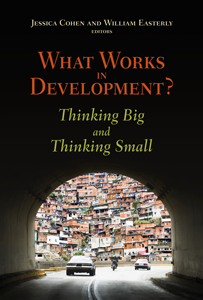The Civil War in Development Economics
 Few people outside academia realize how badly Randomized Evaluation has polarized academic development economists for and against. My little debate with Sachs seems like gentle whispers by comparison.
Want to understand what’s got some so upset and others true believers? A conference volume has just come out from Brookings. At first glance, this is your typical sleepy conference volume, currently ranked on Amazon at #201,635.
Few people outside academia realize how badly Randomized Evaluation has polarized academic development economists for and against. My little debate with Sachs seems like gentle whispers by comparison.
Want to understand what’s got some so upset and others true believers? A conference volume has just come out from Brookings. At first glance, this is your typical sleepy conference volume, currently ranked on Amazon at #201,635.
But attendees at that conference realized that it was a major showdown between the two sides, and now the volume lays out in plain view the case for the prosecution and the case for the defense of Randomized Evaluation.
OK, self-promotion confession, I am one of the editors of the volume, and was one of the organizers of the conference (both with Jessica Cohen). But the stars of the volume are the speakers and commentators: Nava Ashraf (Harvard Business School), Abhijit Banerjee (MIT), Nancy Birdsall (Center for Global Development), Anne Case (Princeton University), Alaka Halla (Innovations for Poverty Action), Ricardo Hausman (Harvard University), Simon Johnson (MIT), Peter Klenow (Stanford University), Michael Kremer (Harvard), Ross Levine (Brown University), Sendhil Mullainathan (Harvard), Ben Olken (MIT), Lant Pritchett (Harvard), Martin Ravallion (World Bank), Dani Rodrik (Harvard), Paul Romer (Stanford University), and David Weil (Brown). Angus Deaton also gave a major luncheon talk at the conference, which was already committed for publication elsewhere. A previous blog discussed his paper.
Here’s an imagined dialogue between the two sides on Randomized Evaluation (RE) based on this book:
FOR: Amazing RE power lets us identify causal effect of project treatment on the treated.
AGAINST: Congrats on finding the effect on a few hundred people under particular circumstances, too bad it doesn’t apply anywhere else.
FOR: No problem, we can replicate RE to make sure effect applies elsewhere.
AGAINST: Like that’s going to happen. Since when is there any academic incentive to replicate already published results? And how do you ever know when you have enough replications of the right kind? You can’t EVER make a generic “X works” statement for any development intervention X. Why don’t you try some theory about why things work?
FOR: We are now moving in the direction of using RE to test theory about why people behave the way they do.
AGAINST: I think we might be converging on that one. But your advertising has not yet got the message, like the JPAL ad on “best buys on the Millennium Development Goals.”
FOR: Well, at least it’s better than your crappy macro regressions that never resolve what causes what, and where even the correlations are suspect because of data mining.
AGAINST: OK, you drew some blood with that one. But you are not so holy on data mining either, because you can pick and choose after the research is finished whatever sub-samples give you results, and there is also publication bias that shows positive results but not zero results.
FOR: OK we admit we shouldn’t do that, and we should enter all REs into a registry including those with no results.
AGAINST: Good luck with that. By the way, even if do you show something “works,” is that enough to get it adopted by politicians and implemented by bureaucrats?
FOR: But voters will want to support politicians who do things that work based on rigorous evidence.
AGAINST: Now you seem naïve about voters as well as politicians. Please be clear: do RE-guided economists know something the local people do not know, or do they have different values on what is good for them? What about tacit knowledge that cannot be tested by RE? Why has RE hardly ever been used for policymaking in developed countries?
FOR: You can take as many potshots as you want, at the end we are producing solid evidence that convinces many people involved in aid.
AGAINST: Well, at least we agree on the on the much larger question of what is not respectable evidence, namely, most of what is currently relied on in development policy discussions. Compared to the evidence-free majority, what unites us is larger than what divides us.
 From Aid to Equality
From Aid to Equality

 In a recent experiment, a team of scientists trained a vervet monkey to open a container of apples, a task no other monkey in her group could do. She was well-compensated for this service by the other monkeys, who began to spend a lot of time grooming her (apparently, grooming is the monkey unit of exchange). Then, the scientists trained another monkey in the group to get the apples, and the “price” for the service (ie the amount of grooming the apple-providing monkeys received) went down.
In a recent experiment, a team of scientists trained a vervet monkey to open a container of apples, a task no other monkey in her group could do. She was well-compensated for this service by the other monkeys, who began to spend a lot of time grooming her (apparently, grooming is the monkey unit of exchange). Then, the scientists trained another monkey in the group to get the apples, and the “price” for the service (ie the amount of grooming the apple-providing monkeys received) went down.  On correcting stereotypes, consider the Willie Horton ad of the presidential election of 1988 of the George Bush, Sr. vs. Michael Dukakis. A political group allied with Bush ran an ad featuring a scary picture of Willie Horton (see also the
On correcting stereotypes, consider the Willie Horton ad of the presidential election of 1988 of the George Bush, Sr. vs. Michael Dukakis. A political group allied with Bush ran an ad featuring a scary picture of Willie Horton (see also the